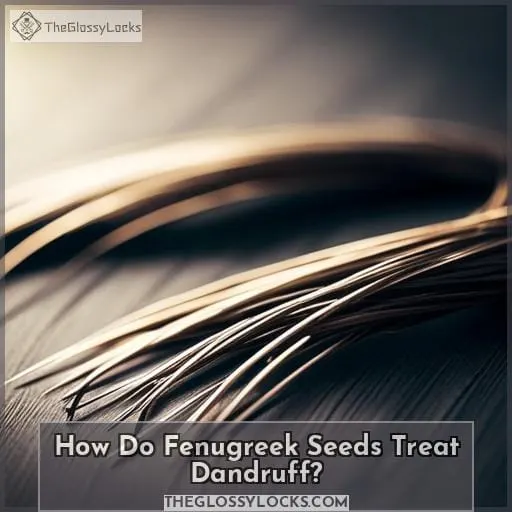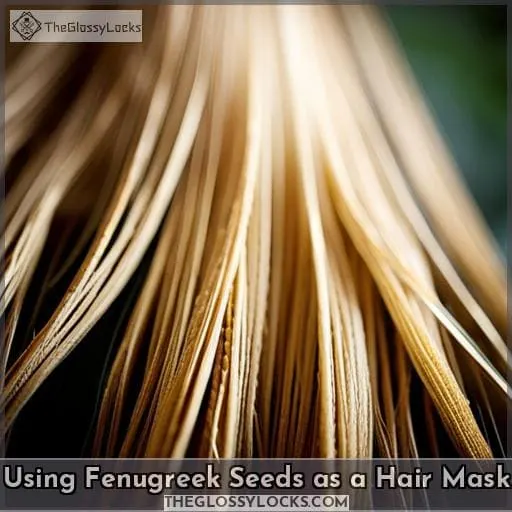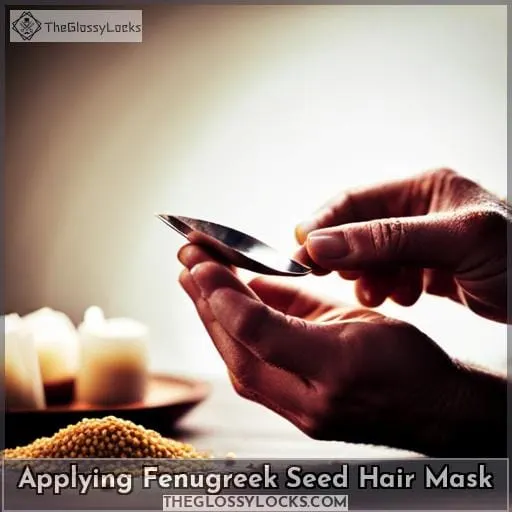This site is supported by our readers. We may earn a commission, at no cost to you, if you purchase through links.
 Suffering flaky, itchy scalp? Before grabbing medicated shampoos, nourish hair follicles naturally with fenugreek. These seeds boast antifungal and anti-inflammatory properties ideal for soothing dandruff.
Suffering flaky, itchy scalp? Before grabbing medicated shampoos, nourish hair follicles naturally with fenugreek. These seeds boast antifungal and anti-inflammatory properties ideal for soothing dandruff.
Whip up a rejuvenating hair mask mixing ground fenugreek, lemon juice, and coconut oil to gently cleanse while curbing fungus overgrowth responsible for flakes. Apply liberally onto scalp and lengths, let sit 20 minutes, then rinse. The soothing sensation promises healthy, flake-free locks.
Table Of Contents
- Key Takeaways
- How Do Fenugreek Seeds Treat Dandruff?
- Using Fenugreek Seeds as a Hair Mask
- Combining Fenugreek Seeds With Other Ingredients
- Applying Fenugreek Seed Hair Mask
- Potential Side Effects of Fenugreek Seeds
- Frequently Asked Questions (FAQs)
- How long do I leave the fenugreek hair mask on for maximum benefits?
- Can I use a fenugreek hair mask if I have color-treated or chemically processed hair?
- Is it okay to use a fenugreek hair mask everyday or will overuse cause problems?
- What is the shelf life of a premixed fenugreek hair mask stored in the refrigerator?
- If the fenugreek hair mask accidentally gets in my eyes while applying to my scalp, what should I do?
- Conclusion
Key Takeaways
- Fenugreek seeds have natural antifungal and anti-inflammatory properties that can help treat dandruff by soothing itchy scalp and reducing inflammation, itching, and flaking.
- Fenugreek hair masks, when blended with ingredients like lemon, coconut oil, amla powder or curd, can help moisturize the scalp while combating excess fungus growth.
- It’s important to patch test fenugreek before widespread use due to potential allergic reactions like skin irritation, rashes, or swelling. Start slowly.
- To get the best results, apply fenugreek hair masks evenly across sections of hair, leaving on for 30-45 minutes before washing out. Using 2-3 times a week helps curb dandruff.
How Do Fenugreek Seeds Treat Dandruff?
You’ll be glad to know fenugreek seeds fight dandruff with natural antifungal properties, soothing scalp inflammation.
The seeds’ soothing compounds reduce itching and flaking while antifungal elements combat excess fungus growth.
Using a fenugreek hair mask regularly could help restore scalp health and treat stubborn dandruff.
Antifungal Properties
With antifungal properties, fenugreek seeds fight dandruff by targeting the fungi that cause flaky scalps. The seeds contain compounds that kill the fungus, reducing scalp inflammation and irritation. Regular application strengthens hair follicles, promotes growth, and prevents further hair loss from damaging dandruff and fungus overgrowth.
Used in combination with other natural ingredients like lemon juice or apple cider vinegar, fenugreek seeds create an effective antifungal environment on the scalp.
Soothing Inflammation
You’ll find fenugreek also tackles inflammation that causes dandruff’s irritating itch. Its soothing effects calm the scalp for relief from flakes and discomfort. Natural remedies like fenugreek promote scalp health with antioxidants and antifungal properties, key for DIY hair care during damaging summer weather.
| Cause | Effect |
|---|
Sweat and Oil Buildup
Sensitivity to Hair Products
Change of Seasons
Using Fenugreek Seeds as a Hair Mask
To banish dandruff, apply a soothing fenugreek and lemon mask or rich fenugreek and coconut oil mask. Target fungus and inflammation with antifungal fenugreek while gently exfoliating and nourishing your scalp.
See the points below detailing how to mix and apply these natural, dandruff-fighting hair masks.
Fenugreek and Lemon Mask
You can create an effective hair mask for fighting dandruff by combining fenugreek seeds with the antifungal properties of lemon.
- Mix 2 tbsp fenugreek paste with 1 tbsp lemon juice
- Apply to scalp and hair roots
- Leave on for 30 mins
- Rinse out thoroughly
The citric acid in lemon boosts fenugreek’s antifungal action against dandruff. Using this nourishing hair mask 2-3 times a week helps hydrate hair, reduce summer damage, increase thickness, and prevent allergic reactions.
Fenugreek and Coconut Oil Mask
Create your mask by combining soaked fenugreek seeds with coconut oil to moisturize your scalp and treat dandruff. The fenugreek benefits and coconut collaboration make a dynamic duo for dandruff. This oil infusion mask magic utilizes methi seeds’ antifungal properties while the coconut nourishes for scalp health and hair growth.
Combining Fenugreek Seeds With Other Ingredients
You’ll boost fenugreek’s antifungal properties by adding amla powder or curd.
The vitamin C in amla enhances blood flow to refresh follicles while the lactic acid in curd exfoliates flakes.
Blend together soaked fenugreek seeds with either ingredient into a nourishing hair paste targeting stubborn dandruff.
Curd
How might curd boost a fenugreek seed hair mask’s effectiveness against dandruff when combining ingredients?
The probiotics in curd can balance scalp bacteria while the lactic acid gently exfoliates.
When making a DIY fenugreek-curd mask, use plain full-fat curd for the nourishing fats.
Apply small sections at a time for maximum contact with the scalp before rinsing.
Amla Powder
When mixing fenugreek seeds with amla powder for an anti-dandruff hair mask, the vitamins and minerals in amla complement fenugreek’s soothing antifungal properties.
Amla is rich in vitamin C and antioxidants that nourish the scalp.
It balances pH levels to reduce dandruff and hair loss.
The combination stimulates blood flow to hair follicles, encouraging growth.
Applying Fenugreek Seed Hair Mask
When using a fenugreek mask to combat dandruff, focus application on the scalp itself where flakes originate.
To maximize results, apply the soothing antifungal paste to clean hair every 2-3 days, leaving it on for at least 30 minutes before rinsing.
Monitor for skin irritation and discontinue use if any develops.
Application Tips
After mixing your fenugreek hair mask, apply it properly by sectioning your hair and using a wide-tooth comb to distribute the paste evenly from roots to tips.
Benefits:
- Stimulates growth
- Conditions hair
- Fights dandruff
Potential Issues:
- Can cause diarrhea
- Risk of allergic reaction
Tips:
- Use 2x per week
- Leave in 30 min
- Patch test first
How Often to Apply
After using a fenugreek seed hair mask, you’ll want to apply it two to three times a week for best results.
This provides regular benefits without overdoing it or disrupting your hair care routine.
Using it more often risks hair dryness while using it less means missing out on the mask’s long-term effects.
If it doesn’t suit, try alternating with other natural treatments.
Potential Side Effects of Fenugreek Seeds
When using fenugreek seeds, be aware they may cause allergic reactions or digestive issues in some people.
If you experience any skin irritation, rash, abdominal pain, diarrhea, or gas after applying a fenugreek hair mask, discontinue use.
Checking with your doctor before trying fenugreek, especially if pregnant or nursing, can help prevent adverse reactions.
Allergies
You may develop allergies from using fenugreek seeds. To prevent reactions, first do a patch test.
Allergic reactions manifest as rashes, swelling, and breathing issues. Stop using fenugreek immediately if you experience these.
While daily use may promote hair thickening, it increases allergy risk.
Alternatively, use fenugreek as a leave-in conditioner twice weekly. This provides benefits while minimizing exposure.
Digestive Issues
You’re looking at digestive problems when ingesting fenugreek seeds, including diarrhea, gas, and bloating.
- Stomach cramps
- Nausea
- Flatulence
- Loose stools
Ingesting too many fenugreek seeds can irritate the digestive tract, causing abdominal discomfort. Start with small amounts to assess tolerance. Consider an elimination diet to identify triggers. Support healthy gut flora with probiotics and prebiotics for balanced digestion.
Frequently Asked Questions (FAQs)
How long do I leave the fenugreek hair mask on for maximum benefits?
Leave the fenugreek hair mask on for 30-45 minutes before rinsing thoroughly. This allows the active compounds time to penetrate the scalp and hair follicles for maximum medicinal benefits.
Can I use a fenugreek hair mask if I have color-treated or chemically processed hair?
Yes, fenugreek masks can be used on color-treated hair when diluted and applied carefully.
Always do a strand test first to check for sensitivities.
Mix a small amount with conditioner, apply to hair ends only, and rinse after 5-10 minutes to nourish hair while minimizing risks.
Proceed cautiously, evaluating hair health frequently.
Is it okay to use a fenugreek hair mask everyday or will overuse cause problems?
Overusing fenugreek masks can dry out your hair and scalp.
Apply a fenugreek mask no more than 1-2 times per week for best results.
Let your hair rest in between uses.
What is the shelf life of a premixed fenugreek hair mask stored in the refrigerator?
A premixed fenugreek hair mask will last up to 1 week when properly stored in an airtight container in the refrigerator. To maximize freshness and potency, make small batches you can use within a few days.
If the fenugreek hair mask accidentally gets in my eyes while applying to my scalp, what should I do?
If the mask gets in your eyes, immediately rinse them with cool water for 15-20 minutes.
Don’t rub your eyes, as this can cause further irritation.
If discomfort persists, see an optometrist to evaluate for corneal abrasion or conjunctivitis.
Conclusion
As the saying goes, prevention is better than cure. Treat dandruff at the root before flakes take hold by making fenugreek seeds a staple. This age-old remedy soothes inflammation and curbs fungus overgrowth that triggers irritating fenugreek hair mask for dandruff.
Blend into masks alongside ingredients like lemon juice and coconut oil for a soothing sensation and healthy, flake-free locks. Apply liberally onto scalp and lengths, let sit 20 minutes, then rinse. With this regular TLC, say goodbye to embarrassing white specks.








